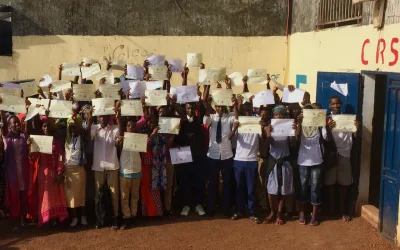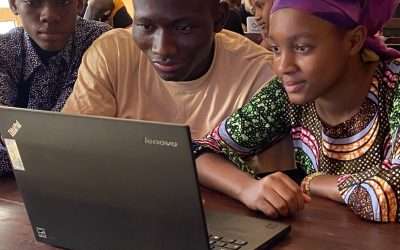Education is a universal right and a matter of justice; educating girls also drives poverty alleviation and development for the whole community. Girls’ education strengthens economies and creates jobs.
Communities are more stable — and can recover faster after conflict — when girls are educated.
Educated girls are healthier citizens who raise healthier families.
Educated girls are less likely to marry young or contract HIV — and more likely to have healthy, educated children. Each additional year of school a girl completes cuts both infant mortality and child marriage rates.
Free Menstrual health kits improve access to education for girls
Investing in girls’ education by supplying menstrual health kits is good for our planet! The Brookings Institution calls secondary schooling for girls the most cost-effective and best investment against climate change while the kits themselves keep pads out of landfill.
Girls at Conakry Reliance School struggle to pay for school and exam fees as families support their male children’s education. Girls struggle more with inadequate hygiene facilities when they hit puberty and the cost of menstrual hygiene supplies often keeps them from school. Poor families often offer their girl children for marriage as they hit puberty, believing that marriage is their only option, wanting to relieve the burden of feeding and housing their daughters and hoping to avoid the stigma of pregnancy outside of marriage.
Guinea has been largely forgotten by the West until Ebola broke out within its borders in 2014, but is one of the poorest and least developed countries in the world (179th out of 189). Ranked 33/51 countries in Africa for its progress against Sustainable Development Goals, Guinea has red lights for progress on poverty, hunger, health education and gender equality.
These poor poverty and health outcomes are driven by extreme gender inequality (source Unicef).
- FGM rates are the second highest in Africa at 97%
- Early marriage is the norm with 20% of girls married by the age of 15
- Female literacy rates are low and are almost half those of males at 21.8%
- Female secondary enrolment is 25.9% (40.5% male)
- Girls attendance at secondary school is even lower at 17% (27% male)


